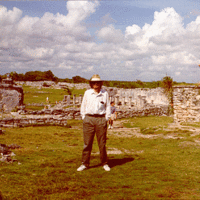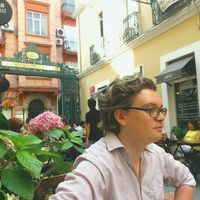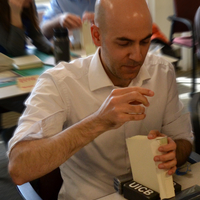
Fred Jenkins
I had the good fortune to study classics and ancient history with Carl Trahman, Archie Christopherson, Mike Sage, and Bernie Fenik at the University of Cincinnati in the 1970s. Then I did graduate work at the University of Illinois at Urbana with Michael Browne, Miro Marcovich, David Sansone, Harry Gotoff, Jack Bateman, Kevin Newman, and David Bright. Too many of them are now gone. Since there were few jobs in classics in the mid-eighties, I then went to library school at Illinois, where I studied with Don Krummel, among others. I have mostly made a living as a rare book cataloger and then as a library administrator, while continuing to teach Latin, Greek, and Roman history.
less
Related Authors
Aneurin Ellis-Evans
University of Oxford
Johannes Zachhuber
University of Oxford
Ian Young
Australian Catholic University
John Sellars
Royal Holloway, University of London
Alessandro Sebastiani
SUNY: University at Buffalo
Richard P Martin
Stanford University
Brent Nongbri
Norwegian School of Theology
Mirko Canevaro
University of Edinburgh
Derek Johnston
Queen's University Belfast
David Seamon
Kansas State University
InterestsView All (52)










Uploads
Books by Fred Jenkins
Papers by Fred Jenkins
The presenters will share how one library uses concept maps to conduct both quick and in-depth assessments of student learning. Using pre- and post-concept maps, we categorize map terms and measure them against ACRL Information Literacy Standards, the results of which demonstrate that students leave with expanded knowledge of library resources and more sophisticated research approaches. Other libraries measure student concept maps against an ideal map construct, which adds to the flexibility of use.
Attendees will learn how to use concept maps in their own library instruction situations, whether they are leading one-shot instruction sessions or teaching a for-credit course. Attendees will understand the flexibility inherent in this approach and how it translates into results that can be easily understood.
Two departments, however, had 1-credit hour research courses on the books; in one case, the course had been taught over a weekend by a faculty member and in the other case, the course was recently approved. Both courses are required for the students wishing to major in the program. The faculty members sought out both the instruction coordinator and the department library liaison, an indicator of the strong relationship that existed already among the campus units.
After initial discussions, the librarians were given the freedom to redesign the courses, the outcomes of which were aligned to ACRL and discipline-based standards. The courses moved from the weekend meetings into a classroom, where classes are held on a weekly basis and where teaching innovation is encouraged. Course design is similar for both, with emphasis on discipline-specific resources, understanding database construction, resource evaluation, and citation skills. Required textbooks are simply discipline-appropriate style manuals. Students are encouraged to explore research topics relevant to work in other courses or honors undergraduate theses.
The courses combine traditional lecture and resource demonstration with written work and active learning. There are six written assignments, including database comparisons and annotated bibliographies. While most of the written assignments focus on resource evaluation and analysis, in-class exercises test student recall and knowledge about library resources via research scenarios that students must work through and present to their peers. They also practice citation skills, with one class session is devoted entirely to practicing citation construction, which is again presented to their peers. To facilitate understanding of subject headings, students develop and explain alternative subject headings as well as practice with LibraryThing. Students must also demonstrate familiarity with RefWorks. Finally, the course makes use of a course management system and LibGuides software.
Assessment of student learning occurs throughout the course with evaluation of written work, successful demonstration of research skills in front of peers, through concept mapping, and with brief pre- and post-tests at the start and end of the courses. Students write paragraphs reflecting on the research process and they also conduct peer reviews for several assignments. At the end of the course, students evaluate course content and structure through clickers and in written feedback to open-ended questions. These assessments are used by both the library and the departments to evaluate the course as well.
This poster will highlight the integration of the library into the University curriculum, the approach these librarians take in blending traditional instruction expectations with new technologies, and the activities used to engage students with the material.